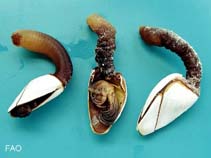Lepas anatifera Linnaeus, 1758
Duck barnacle| Native range | All suitable habitat | Point map | Year 2050 |

|
| This map was computer-generated and has not yet been reviewed. |
| Lepas anatifera AquaMaps Data sources: GBIF OBIS |
Classification / Names Common names | Synonyms | CoL | ITIS | WoRMS
Thecostraca | Scalpellomorpha | Lepadidae
Environment: milieu / climate zone / depth range / distribution range Ecology
Pelagic; depth range 0 - 75 m (Ref. 105990). Tropical; 81°N - 57°S, 179°W - 180°E
Distribution Countries | FAO areas | Ecosystems | Occurrences | Introductions
Circumglobal (76°N to 57°S): Indian Ocean, Europe, California to Panama, Japan, Philippines, Australia , North America, northern Gulf of Mexico to Brazil and Argentina.
Length at first maturity / Size / Weight / Age
Maturity: Lm ? range ? - ? cm
Life cycle and mating behavior Maturity | Reproduction | Spawning | Eggs | Fecundity | Larvae
Main reference
References | Coordinator | Collaborators
Young, P.S. 1998 Maxillopoda. Thecostraca. p. 263-285. In Young, P.S. (ed.). Catalogue of Crustacea of Brazil. Museo Nacional. Rio de Janeiro. (Ref. 3549)
IUCN Red List Status
(Ref. 130435: Version 2025-1)
CITES status (Ref. 108899)
CMS (Ref. 116361)
Threat to humans
Human uses
Fisheries: commercial
| FishSource |
Tools
More information
Max. ages / sizes
Length-weight rel.
Length-length rel.
Length-frequencies
Mass conversion
Abundance
Internet sources
BHL | BOLD Systems | CISTI | DiscoverLife | FAO(Publication : search) | Fishipedia | GenBank (genome, nucleotide) | GloBI | Gomexsi | Google Books | Google Scholar | Google | PubMed | Tree of Life | Wikipedia (Go, Search) | Zoological Record



